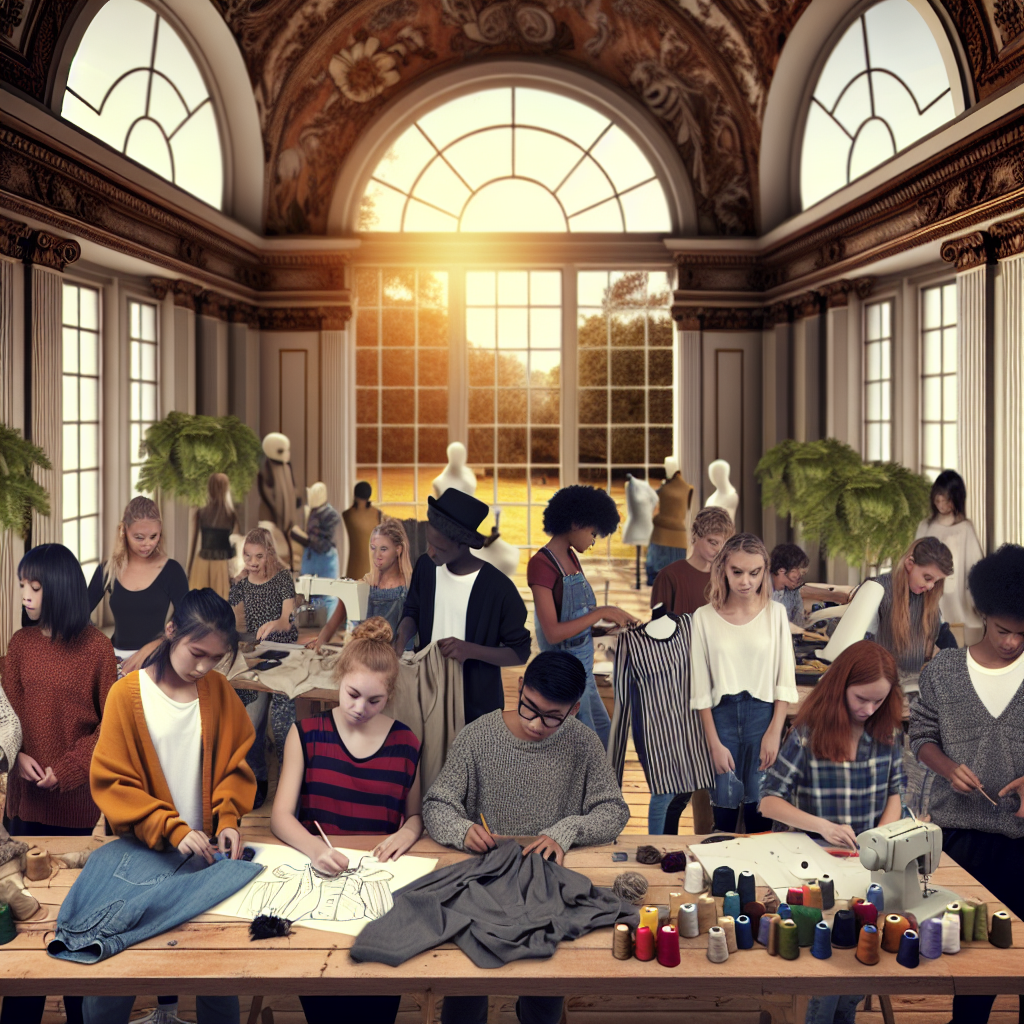Sustainable Fashion Design: Youth Programs at Luxury Houses
Introduction: The Future of Luxury Lies in Sustainability
As the fashion industry grapples with the urgent need for sustainability, luxury fashion houses are taking a proactive stance by investing in the future—specifically, in young, emerging talent who will lead the next generation of ethical design. Recognizing that sustainability is not only an environmental necessity but also a marker of true luxury, renowned fashion brands are launching specialized programs to educate and inspire young designers.
Elite brands such as Gucci, Louis Vuitton, Prada, and Stella McCartney are integrating sustainable fashion education into their youth programs, hoping to cultivate a new wave of designers who prioritize both luxury craftsmanship and environmental ethics. These programs offer mentorship with industry experts, workshops on sustainable materials and ethical production techniques, and collaborations with forward-thinking artisans.
Parents of means who are invested in their children’s future—both as potential designers and global citizens—should consider the benefits of enrolling their children in these exclusive programs. Sustainable fashion design is more than an artistic pursuit; it is a movement shaping the future of luxury and commerce.
Why Sustainable Fashion Education Matters
Fashion is a billion-dollar industry with a profound impact on the environment. According to a 2018 report by the United Nations Environment Programme (UNEP), the fashion industry contributes to approximately 10% of global carbon emissions and 20% of global wastewater production ([UNEP Report](https://www.unep.org/news-and-stories/story/putting-brakes-fast-fashion)). Given these alarming statistics, luxury fashion houses are taking action—not only in production but also in education.
Research highlights the importance of early exposure to sustainability principles in fashion education. A study in the *Journal of Cleaner Production* found that students who participated in sustainability-focused training were more likely to implement eco-friendly methods in their professional work, even in luxury sectors ([Freudenreich & Schaltegger, 2020](https://www.sciencedirect.com/science/article/abs/pii/S0959652620309303)). This suggests that sustainable fashion programs not only instill ethical values but also ensure that future designers actively seek greener solutions throughout their careers.
Luxury Brands Leading the Charge in Sustainability
Gucci Changemakers: Empowering the Designers of Tomorrow
Gucci’s **Gucci Changemakers** program provides young designers and students with access to mentorship, funding, and educational resources to develop sustainable fashion projects. The initiative focuses on material innovation, closed-loop production, and ethical labor practices, ensuring that the next generation of fashion leaders is well-versed in sustainable design principles ([Gucci Changemakers](https://equilibrium.gucci.com/)).
Stella McCartney: A Legacy of Ethical Craftsmanship
A pioneer in sustainable luxury, Stella McCartney takes sustainability a step further with her **Sustainable Fashion Academy**. Students engage in hands-on learning with bio-based materials, zero-waste designs, and sustainable business models. The program reflects McCartney’s long-standing commitment to ethical fashion and equips young designers with the tools they need to revolutionize the industry ([Stella McCartney Sustainability](https://www.stellamccartney.com/experience/en/sustainability/)).
Collaborations with Prestigious Fashion Institutions
Luxury brands are also partnering with elite fashion institutions to embed sustainability principles into their learning curriculums. The **Institut Français de la Mode (IFM)** in Paris collaborates with luxury labels like Hermès, LVMH, and Chanel to develop cutting-edge coursework. Studies from IFM indicate that sustainability-focused education can increase students’ awareness of ethical design by over 60%, offering them hands-on experience with eco-conscious materials and ethical production methods ([IFM Study](https://www.ifmparis.fr/en/)).
The Impact of Sustainability-Focused Fashion Education
From organic material research to biodegradable textiles and circular fashion systems, these programs pave the way for a more responsible luxury industry. By combining traditional craftsmanship with advanced ecological sciences, high-end fashion houses ensure that sustainability transcends marketing and becomes a fundamental aspect of their design philosophy.
Why Parents Should Consider These Exclusive Programs
Parents of young, aspiring designers should recognize the unique opportunity that sustainable fashion programs provide. As sustainability becomes a critical pillar of luxury, equipping children with eco-conscious fashion education prepares them for leadership roles in an ever-evolving industry.
Enrolling in these programs means:
– Gaining access to top-tier mentorship from leading fashion executives and designers.
– Learning cutting-edge sustainable craftsmanship techniques.
– Building a strong professional network within luxury fashion.
– Becoming part of a global movement transforming high fashion into a sustainable industry.
Conclusion: A New Era for Luxury Fashion
As luxury consumers increasingly prioritize sustainability, fashion houses must continue fostering the next generation of eco-conscious designers. These youth programs not only shape some of the brightest young creatives in the world but also instill vital environmental values that will guide the future of luxury fashion.
By investing in these forward-thinking initiatives, luxury fashion brands ensure that craftsmanship and sustainability are inseparable, leading the industry into a responsible and innovative future—one that is as ethically conscious as it is exquisitely crafted.
**Summary:**
Luxury fashion houses are investing in youth programs that educate and inspire the next generation of designers to prioritize both luxury craftsmanship and environmental ethics. These programs, offered by brands like Gucci, Louis Vuitton, Prada, and Stella McCartney, provide mentorship, workshops on sustainable materials and ethical production, and collaborations with forward-thinking artisans. By equipping young designers with eco-conscious fashion education, these initiatives are shaping the future of luxury and ensuring that sustainability becomes a fundamental aspect of the industry.
**References:**
– [UNEP Report](https://www.unep.org/news-and-stories/story/putting-brakes-fast-fashion)
– [Gucci Changemakers](https://equilibrium.gucci.com/)
– [Stella McCartney Sustainability](https://www.stellamccartney.com/experience/en/sustainability/)
– [IFM Study](https://www.ifmparis.fr/en/)
– [Freudenreich & Schaltegger, 2020](https://www.sciencedirect.com/science/article/abs/pii/S0959652620309303)

Dominic E. is a passionate filmmaker navigating the exciting intersection of art and science. By day, he delves into the complexities of the human body as a full-time medical writer, meticulously translating intricate medical concepts into accessible and engaging narratives. By night, he explores the boundless realm of cinematic storytelling, crafting narratives that evoke emotion and challenge perspectives. Film Student and Full-time Medical Writer for ContentVendor.com




